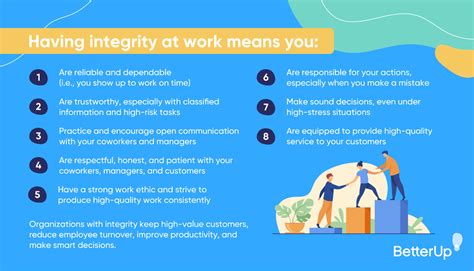Integrity In The Workplace: Definition And Examples

Integrity is a vital component of any successful workplace. It’s not just about being honest and ethical; it’s about being consistent, reliable, and trustworthy. In today’s fast-paced, competitive business world, integrity is more important than ever. In this article, we’ll explore the meaning of integrity in the workplace, its importance, and some examples of how it can be demonstrated.
What is Integrity?
Integrity is defined as the quality of being honest and having strong moral principles. In the workplace, integrity means doing the right thing, even when no one is watching. It means being truthful, reliable, and accountable for your actions. Employees with integrity are essential to building a positive work environment and maintaining a company’s reputation.
Why is Integrity Important in the Workplace?
Integrity is crucial in the workplace for several reasons:
- Trust: When employees have integrity, they build trust with their colleagues and customers. This trust is essential for building strong relationships and ensuring that everyone is working towards the same goals.
- Reputation: A company’s reputation is built on the integrity of its employees. If employees act with integrity, customers and clients will see the company as trustworthy and reliable.
- Compliance: Many industries have regulations and laws that must be followed. Employees with integrity are more likely to follow these rules, ensuring that the company stays compliant and avoids legal issues.
- Productivity: When employees act with integrity, they are more likely to be productive and focused on their work. They are not distracted by dishonest or unethical activities, and they are more likely to work collaboratively with their colleagues.
Examples of Integrity in the Workplace
Integrity can be demonstrated in many ways in the workplace. Here are some examples:
1. Honesty
Honesty is an essential component of integrity. Employees who are honest with their colleagues and customers build trust and credibility. For example, if a salesperson is honest about the limitations of a product, the customer will appreciate the transparency and be more likely to trust the salesperson in the future.
2. Accountability
Employees with integrity take responsibility for their actions and are accountable for their mistakes. They don’t try to shift the blame onto others or make excuses. For example, if a project manager misses a deadline, they should take responsibility for the delay and work to make things right.
3. Reliability
Reliability is another crucial aspect of integrity. Employees who are reliable follow through on their commitments and meet their deadlines. For example, if a team member promises to complete a task by a certain date, they should make sure to deliver on time.
4. Confidentiality
Employees with integrity respect the confidentiality of sensitive information. They don’t share confidential information with unauthorized individuals or use it for personal gain. For example, if an HR professional handles sensitive employee information, they should make sure to keep it confidential and not share it with anyone who doesn’t have a legitimate need to know.
5. Fairness
Employees with integrity treat everyone fairly and without bias. They don’t show favoritism or discriminate against anyone based on their race, gender, or other characteristics. For example, if a manager is responsible for hiring new employees, they should make sure to evaluate candidates based on their qualifications and not their personal biases.
Conclusion
Integrity is a fundamental aspect of any successful workplace. It’s essential for building trust, maintaining a good reputation, staying compliant, and promoting productivity. Employees with integrity are honest, accountable, reliable, confidential, and fair. By demonstrating integrity in the workplace, employees can help create a positive work environment and contribute to the success of their company.
FAQs
What are the benefits of having integrity in the workplace?
Integrity is crucial in the workplace for several reasons. Employees who act with integrity build trust with their colleagues and customers, maintain a company’s reputation, follow regulations and laws, and are more productive and focused on their work.
How can I demonstrate integrity in the workplace?
There are many ways to demonstrate integrity in the workplace. Some examples include being honest, accountable, reliable, confidential, and fair. Employees should also follow ethical and legal standards, treat others with respect, and avoid conflicts of interest.
What are the consequences of lacking integrity in the workplace?
Lacking integrity in the workplace can have significant consequences. It can damage a company’s reputation, lead to legal issues, decrease productivity, and harm relationships with colleagues and customers. Employees who lack integrity may also face disciplinary action or lose their job.

